各单元重点短语句子
- 格式:doc
- 大小:53.00 KB
- 文档页数:12
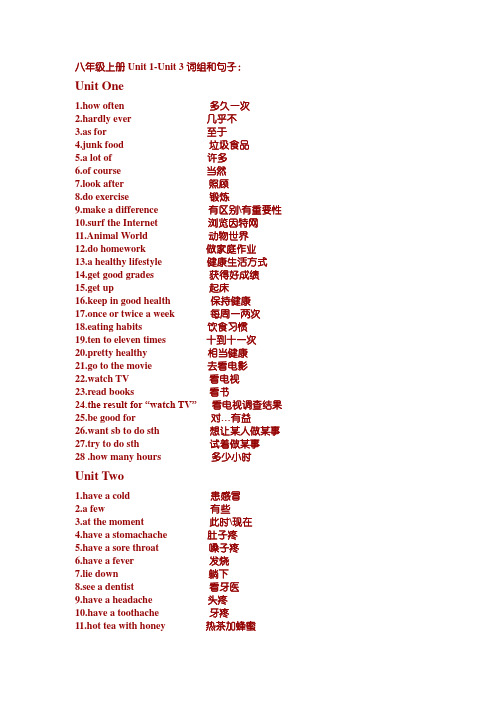
八年级上册Unit 1-Unit 3词组和句子:Unit One1.how often 多久一次2.hardly ever 几乎不3.as for 至于4.junk food 垃圾食品5.a lot of 许多6.of course 当然7.look after 照顾8.do exercise 锻炼9.make a difference 有区别\有重要性10.surf the Internet 浏览因特网11.Animal World 动物世界12.do homework 做家庭作业13.a healthy lifestyle 健康生活方式14.get good grades 获得好成绩15.get up 起床16.keep in good health 保持健康17.once or twice a week 每周一两次18.eating habits 饮食习惯19.ten to eleven times 十到十一次20.pretty healthy 相当健康21.go to the movie 去看电影22.watch TV 看电视23.read books 看书24.the result for “watch TV”看电视调查结果25.be good for 对…有益26.want sb to do sth 想让某人做某事27.try to do sth 试着做某事28 .how many hours 多少小时Unit Two1.have a cold 患感冒2.a few 有些3.at the moment 此时\现在4.have a stomachache 肚子疼5.have a sore throat 嗓子疼6.have a fever 发烧7.lie down 躺下8.see a dentist 看牙医9.have a headache 头疼10.have a toothache 牙疼11.hot tea with honey 热茶加蜂蜜12.stressed out 紧张13.go to bed early 早睡觉14.listen to music 听音乐15.go to party 参加音乐会16.on the other hand 在另一方面17.stay healthy 保持健康18.have a sore back 背疼19.traditional Chinese doctors 传统中医20.a balance of yin and yang 阴阳平衡21.too much 太多22.a balanced diet 饮食平衡23.go out at night 在晚上出去24.feel well 感觉舒服25.conversation practice 对话练习26.host family 房东27.give sb a fever 导致某人发烧Unit Three1.at home 在家2.how long 多久3.get back 回来4.think about 思考5.decide on 决定\选定6.theGreat Wall 长城7.go fishing 去钓鱼8.take a vacation 去度假9.something different 不同的东西10.go camping 去野营11.go hiking 徒步行12.show sb sth 给某人看某物13.have a good time 玩得愉快14.go bike riding 骑自行车行15.go sightingseeing 去观光16.go fishing 去钓鱼17.rent videos 租录像带18.take walks 去散步19.vacation plans 假期计划20.plan to do sth 计划去做某事21.make a movie 拍一部电影22.go swimming 去游泳23.go shopping 去购物Unit 11.What do you usually do on weekends?2.在周末你通常干什么?3.She often goes to the movies.4.她经常去看电影。

外研版| 七年级上册各单元重点单词/短语/句型Module 1 My classmates【重点短语】from... =come from... 来自......2....years old ......岁about... =how about... ......怎么样?Class Ten, Grade Seven 在七年级十班capital of... ...... 的首都/省会name =given name 名name=family name 姓name 英文名字name 中文名字【重点句子】’m Chinese,and I’m from China. 我是中国人, 我来自中国(I’m Chinese, and I come from China.)2. Where are they from 他们来自什么哪里(=Where do they come from)They are from America. 他们来自美国.(=They come from America.)old is that man 那位男子多少岁了He is forty-four. 他44岁4. The students are in Class Five, Grade Seven.这些学生在七年级五班5. Tom is in Class One with Lingling. 汤姆和玲玲在一班。
=Tom with Lingling is in Class One.=Tom and Lingling are in Class One.about you=How about you=And you你呢/你怎么样to Class 6 Grade 7 ! 欢迎到七年级六班。
8. Beijing is the capital of China. 北京是中国的首都。
to see you.=Nice to see you.=Glad to see you. 很高兴见到你。

第三单元重点短语及句型短语:1. far from 离……远2. go straight一直走3. turn left 向左转4. turn right 向右转5. by bike 骑自行车6. by taxi 乘坐出租车7. by car 乘坐小轿车8. by bus 乘坐公交车9. traffic lights交通灯句型:1. Excuse me!打扰一下。
2. Where’s the computer room? 微机室在哪里?I can show you. 我带你去。
(我可以告诉你。
)Is it far from here? 它离这儿远吗?No. It’s near. 不,它离这儿近。
Let me help you. This way, please. 让我帮你吧。
请这边走。
Here it is. 它在这儿。
Thanks. 谢谢。
3. Can you help me? 你可以帮助我吗?Yes? 怎么了?4. I’m lost. 我迷路了。
5. Thanks. 谢谢。
You’re welcome. 不客气。
6. How do you go to school? 你怎样去上学?I go to school by bus.我乘公交车去上学。
7. Red is stop! 红灯停。
8. Yellow is wait! 黄灯等待。
9. Green is go! 绿灯行。
10. Where is the bus stop? 公交站牌在哪儿?Go straight and turn right at the traffic lights.一直走然后在交通灯处向右转。
第四单元重点句型句子:1. Let’s go shopping. 让我们去购物吧。
2. What do you want to buy? 你想要买什么?I want to buy a new dress.我想要买一件新连衣裙。
I don’t want to buy a new dress.我不想买一件新连衣裙。

九年级英语各单元课本中重点短语和句子(UNIT-1 Section B)
1、我并非总是能听懂英语口语。
(5)
2、我不知道如何提高阅读速度。
3、我经常在语法方面犯错误。
4、我没有一起练习英语的伙伴。
5、每个人天生都具有学习的能力。
(6)
6、你是否能把这做好取决于你的学习习惯。
7、激发他们对所学内容的兴趣。
8、研究表明,如果你对某事感兴趣,你的大脑就会更活跃,你也更容易长时间关注它。
9、好的学习者常常将他们需要学习的东西与之感兴趣的东西联系起来。
10、这样他们就不会感到无聊。
11、好的学习者考虑他们擅长什么和需要多练习什么。
12、即使你学得很好的东西,如果你不使用它,你就会忘记它。
13、好的学习者会继续练习他们已经学到的,而且他们不害怕犯错误。
14、他们也寻找一些方法来复习他们已学过的知识。
15、知识源于质疑。
16、你学到的一切变成了你的一部分,并且改变着你,所以要会明智学习,还要学好。
(wisely)
17、记得要在课堂上记笔记,课后自己或者与朋友一起复习它们。
(8)
18、要努力学习并一点点地记住信息,而不是直到最后一分钟才马上学习一切。

11-12 单元词组和句子u.11 词组:go for a walk 去散步milk a cow 挤牛奶ride a horse 骑马feed chickens 喂鸡talk with 和……交谈take photos 拍照show…around… 带领……参观……in the countryside 在农村go fishing 去钓鱼climb the mountains 爬山visit a museum 参观博物馆fire station 消防站draw pictures 画画science museum 科学博物馆by train 乘火车be interested in 对……感兴趣not…at all 一点也不quite a lot 相当多learn about 了解grow strawberries 种植草莓pick strawberries 采草莓at night 在夜晚come out 出来along the way 沿路a lot of 许多;大量go on a school trip 去学校郊游buy sth. for sb. = buy sb. sth.为某人买某物after that 之后all in all 总的来说句子:1.Did you see any cows?你看见奶牛了吗?Yes,I did. I saw quite a lot.是的,我看见了许多。
2.Did Carol ride a horse?卡罗尔骑马了吗?No, she didn’t. But she milked a cow.不,她没有,但她挤牛奶了。
3.How was your school trip?你的学校旅游怎么样?It’s was great.很棒。
4.What did Tina do? 蒂娜干什么了?She picked some strawberries.她摘了些草莓。
5.I visited my grandparents in the countryside.我看望了我在农村的祖父母。
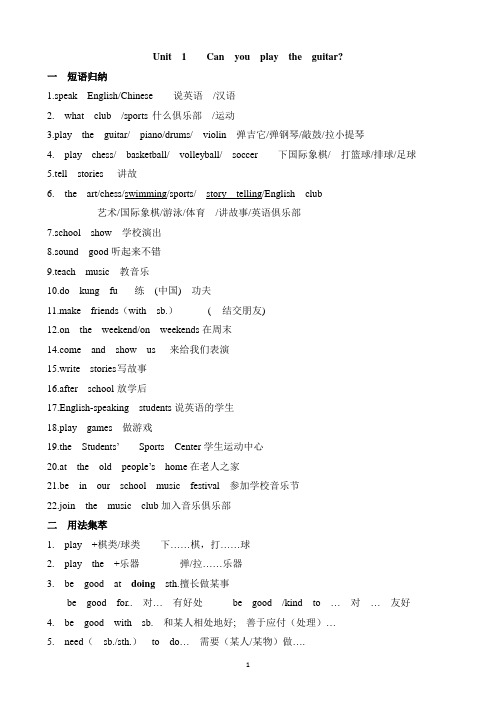
Unit 1 Can you play the guitar?一短语归纳1.speak English/Chinese 说英语/汉语2. what club /sports 什么俱乐部/运动3.play the guitar/ piano/drums/ violin 弹吉它/弹钢琴/敲鼓/拉小提琴4. play chess/ basketball/ volleyball/ soccer 下国际象棋/ 打篮球/排球/足球5.tell stories 讲故6. the art/chess/swimming/sports/ story telling/English club艺术/国际象棋/游泳/体育/讲故事/英语俱乐部7.school show 学校演出8.sound good听起来不错9.teach music 教音乐10.do kung fu 练(中国) 功夫11.make friends(with sb.)( 结交朋友)12.on the weekend/on weekends在周末e and show us 来给我们表演15.write stories 写故事16.after school 放学后17.English-speaking students说英语的学生18.play games 做游戏19.the Students’Sports Center学生运动中心20.at the old people’s home在老人之家21.be in our school music festival 参加学校音乐节22.join the music club加入音乐俱乐部二用法集萃1. play +棋类/球类下……棋,打……球2. play the +乐器弹/拉……乐器3. be good at doing sth.擅长做某事be good for.. 对…有好处be good /kind to …对…友好4. be good with sb. 和某人相处地好; 善于应付(处理)…5. need(sb./sth.)to do…需要(某人/某物)做….6. can + 动词原形能/会做某事7. a little + 不可数名词: 一点儿……9. like to do sth.或like doing sth. 喜欢做某事10.want to do…想做……11.What about…?…怎么样?(后面接Ving/代词/名词)12. talk用法: talk to/with sb. 跟某人说话talk about sth. 谈论某事tell 用法:tell sb sth. 告诉某人某事tell sb to do sth 告诉某人去做某事tell stories 讲故事say用法:say直接加说话的内容/itspeak用法:speak +语言13.help sb. with sth在某方面帮助某人= help sb.(to)do sth14.be free /busy 有空/很忙15. call sb. at+号码拨打某人的……号码16. be in=join …成为…中的一员(P6)17.want …for the school show为学校表演招聘……三经典句必背1. Can you draw? 你会画画吗?Yes, I can. / No, I can’t.是,我会。
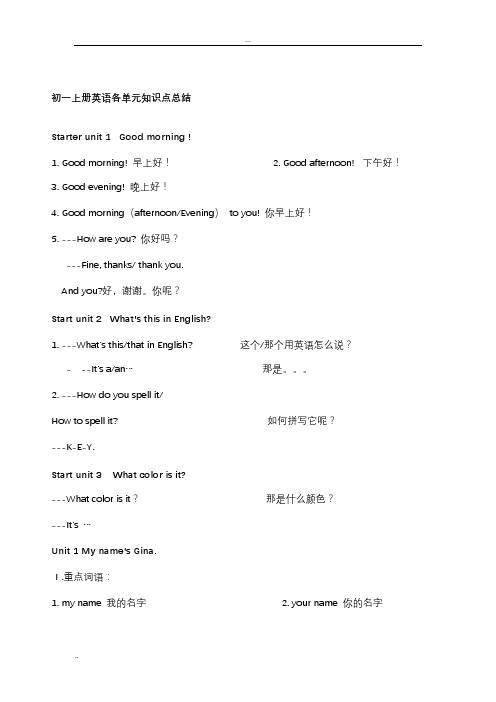
初一上册英语各单元知识点总结Starter unit 1Good morning !1. Good morning! 早上好!2. Good afternoon!下午好!3. Good evening! 晚上好!4. Good morning(afternoon/Evening)to you! 你早上好!5. ---How are you? 你好吗?---Fine, thanks/ thank you.And you?好,谢谢。
你呢?Start unit 2What’s this in English?1. ---What’s this/that in English? 这个/那个用英语怎么说?- --It’s a/an…那是。
2. ---How do you spell it/How to spell it? 如何拼写它呢?---K-E-Y.Start unit 3What color is it?---What color is it?那是什么颜色?---It’s …Unit 1 My name’s Gina.Ⅰ.重点词语:1. my name 我的名字2. your name 你的名字3. last name/ family name 姓4. first name/ given name 名5. ID card 身份证6. school ID card 学生卡7. answer the questions 回答问题8. telephone/phone number 电话号码9. address book 电话号码薄Ⅱ.重点句型:1. ---What’s your name? 你叫什么?---My name is…/I’m…我是。
2. Nice to meet you. / I’m glad to meet you. 见到你很高兴。
3. ---What’s your telephone/phone number? 你的电话是多少?---My telephone/ phone number is…我的电话是。
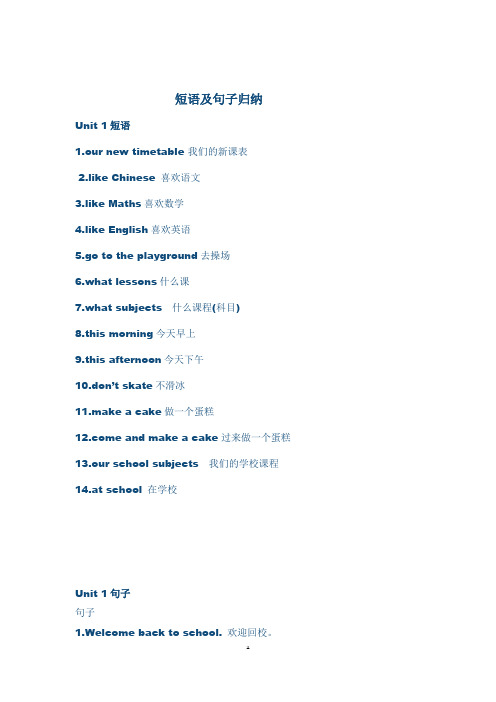
短语及句子归纳Unit 1短语1.our new timetable 我们的新课表2.like Chinese 喜欢语文3.like Maths喜欢数学4.like English喜欢英语5.go to the playground去操场6.what lessons什么课7.what subjects什么课程(科目)8.this morning今天早上9.this afternoon今天下午10.don’t skate不滑冰11.make a cake做一个蛋糕e and make a cake过来做一个蛋糕13.our school subjects我们的学校课程14.at school 在学校Unit 1句子句子1.Welcome back to school. 欢迎回校。
2.Nice to see you. 见到你很高兴。
3.What about you? 你呢?4.It’s fun. 有趣。
5.It’s time for PE. 该上体育课了。
6. A: What subjects do you like? 你喜欢什么科目?B: I like Art and Music.我喜欢美术和音乐。
7.A:What lessons do we have this morning?我们上午有什么课?B:We have English、Chinese、and Maths.我们有英语、语文和数学。
e and make a cake.过来做一个蛋糕。
9.They like Music. We all like English.他们喜欢音乐。
我们都喜欢英语。
Unit 2短语和句子1. after school 放学后2. What day is it today? 今天星期几?3. What a pity! 真遗憾!4. All right. 好的。
5. what day星期几6. on Saturday 在星期六7. what lessons 什么课8.have Chinese and Maths 有语文和数学课9. get up at five 五点起床10. after school放学后11. go and play table tennis去打乒乓球12. a football match 一场足球比赛13. have a swimming lesson 有一节游泳课14. don’t have any lessons 没有课15. every day 每天16. at six 在六点17. come and play table tennis 来打乒乓18. Let’s go and play table tennis. 咱们去打乒乓吧。

英语基础模块1 各单元短语和重要句子Unit 1知识点:First name last name be from=come from Great! Not bad! Telephone number e-mail addresstake care of want to do sth. more than name card I see!重点句子:1.Nice to meet you! - Nice to meet you, too.2.How are you? -Fine, thank you. And you?3.What’s your name? -My name is ….4. Where are you from? -I am from…5. Here’s my name card.6. How old are you?7.How do you do? -how do you do.8. Have a nice weekend! -The same to you.Unit 2知识点:Speak Chinese read in Chinese serve customersrepair computers teach English drive carssing a song use the computer serve the visitorswould like to do sth. send e-mails play computer gameswrite in English apply for sales managerin English重点句子:1.What can you do? - I can speak English.2.Can you say something about yourself?3.I’d like to join the Computer Club.4.Which Class are you in? -I am in Class 3,Grade 2.5.May I have your name,please?6.How old is Sally?7.What positions does Sally want to apply for?8.What’s your e-mail address?9.Could you tell me your phone number?10.What job are you applying for?\What job do you want to apply for?Unit 3知识点:At the school gate plan for sth plan to do sth go shopping good idea shopping list attractive want to do sth clothes storebeautiful dresses on sale hold a birthday party exercise book cell phone notebook textbook on the list original price discount Monday Tuesday Wednesday Thursday Friday Saturday Sunday重点句子:1.What’s on your shopping list?2.What’s your plan for the afternoon?3.I have no idea.4. I have a big surprise for you.5. Would you like to go shopping with me?6. There are many beautiful dresses.7. What can I do for you?\Can I help you?8. I’d like to buy some oranges. 9. How much is the orange?10.It’s on sale now. 11.I will take 5 kilos.12. There are three items on sale on Saturday. 13. Is there any discount?Unit 4知识点:Birthday party______ Christmas party______ Welcome party______ Garden party______ come from______ drink coffee______help yourself______ grape ______ cookie______biscuit______ dragon fruit______ play games______tell jokes______ sing songs______ invite sb to do sth______next Saturday______ play poker______ dance hip-hop______watch TV______ eat a birthday cake______重点句子:1.Welcome to our party!2. This way,please.3. It’s very cold outside.4. Is it always cold at this time in Xi’an?2.What’s the weather like in Australia now?5. Would you like something to drink\eat? - I’d like ..., please.6. What about...?7. Here you are.8. You’re welcome! 9. Would you like to come?Unit 5知识点:Play chess______ go fishing______ listen to music______ collect stamps ______ fly kites______ play computer games______ ride a bike______ love singing______ be crazy about ______ American football______ watch movies ______ play the piano______重点句子:1. What’s your hobby?2. Do you like singing English songs?3. Does she love football?4. They are my favorite.5. I am crazy about Chinese songs.6. What about you?7. I enjoy playing football very much.8. What do you dislike? 9. I hate dancing.10. Dancing is my favorite. 11. What does she like doing?12. I think American football is exciting.13. The film is boring.Unit 6知识点:Eat chicken______ eat out ______ Chinese food______ Western food ______eat at home______ favorite food______ a glass of orange juice ______ all right ______ wait a minute ______ help sb to do sth______ talk about______ introduce sth to sb______ run a restaurant______ make a menu______ make a survey______重点句子:1.Would you like to eat out?2. Do you want to eat out?3. I think Meimei Western Restaurant is better.4. The food is more delicious.5. What’s your favorite food?6. Would you like to order now?7. What’s the specialty of the house?8. Let’s go dutch. 9. I don’t have much money.10. I want to invite my friends to eat Chinese food.11. I want to eat out with my friends.Unit 7知识点:volleyball________ baseball_____ badminton_____ football_____table tennis_____ basketball_____ swimming_____ take a message________ want to do sth________ make a phone call________ do housework________wash clothes________ see you ________ at the moment________ hand out______tell sb to do sth________ sell goods ________ put up________ in the street ________ provide sth for sb________ be glad to do sth________ more and more________look forward to ________ invite sb to do sth________ between …and…________ talk about________ look for________ hold on________ Work as________重点句子:1.The phone call is between Tang Hua and his father.2.This is Ben.3.Wang Yang isn’t in at the moment.4.May I take a message?5.Please tell him to come to school this afternoon6.I want to play basketball with him.7.Ben is making a phone call with Sara.8.Tang Hua is doing housework.9.May I speak to Sara?10.What are you doing now?11.I am playing badminton with XiaoNian at school.12.What’s up?13.Would you like to join us?14.All right! I will tell him\her.15.Please tell him to call me later.16.Some are handing out information booklets in the streets.17.Many of my classmates working as volunteers.Unit 8知识点:traffic lights_______ the second turn_______ turn right_______road _______ crossroads_______ turn left_______go across the road_______ go along_______ get to_______on the right_______ by the roadside_______ by bus_______by subway_______ by train_______ have a look at _______have to_______ it takes sb time to do sth _______in front of_______ go straight_______ opposite to _______go upstairs_______ cinema_______ bus stop_______bookstore_______ hospital_______ supermarket_______airport_______ subway station_______ post office_______miss_______ school surroundings _______ welcome to…_______重点句子:1.How can I get to…?2.Excuse me, Can you tell me the way to…?3.Could you tell me how I can get to…?4.Where is the bank?5.You can’t miss it.你一定会找到的。
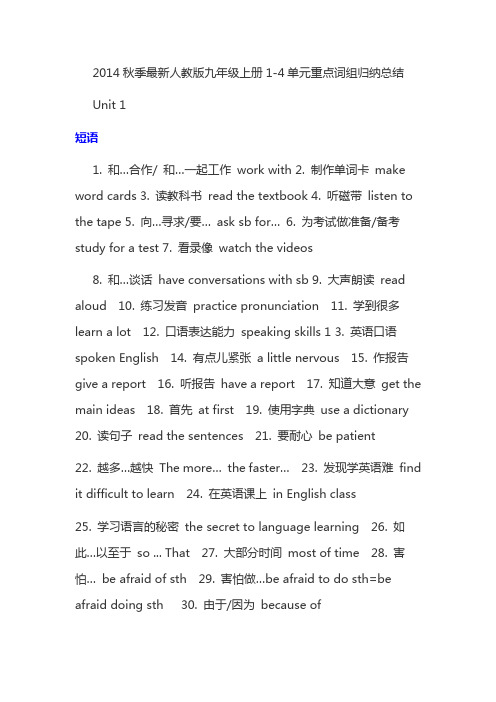
2014秋季最新人教版九年级上册1-4单元重点词组归纳总结Unit 1短语1. 和…合作/ 和…一起工作work with2. 制作单词卡make word cards3. 读教科书read the textbook4. 听磁带listen to the tape5. 向…寻求/要…ask sb for…6. 为考试做准备/备考study for a test7. 看录像watch the videos8. 和…谈话have conversations with sb 9. 大声朗读read aloud 10. 练习发音practice pronunciation 11. 学到很多learn a lot 12. 口语表达能力speaking skills 1 3. 英语口语spoken English 14. 有点儿紧张a little nervous 15. 作报告give a report 16. 听报告have a report 17. 知道大意get the main ideas 18. 首先at first 19. 使用字典use a dictionary 20. 读句子read the sentences 21. 要耐心be patient22. 越多…越快The more…the faster…23. 发现学英语难find it difficult to learn 24. 在英语课上in English class25. 学习语言的秘密the secret to language learning 26. 如此…以至于so ... That 27. 大部分时间most of time 28. 害怕…be afraid of sth 29. 害怕做…be afraid to do sth=be afraid doing sth 30. 由于/因为because of31. 我糟糕的发音my poor pronunciation 32. 埋头在教科hide behind the textbook 33. 令人兴奋和有趣的电exciting and funny movies 34. 爱上…fall in love with 35. 肢体语言body language 36. 脸上的表情expressions on their faces 37. 得到/知道意思get the meaning 38. 有用的句子the useful sentences 39. 小菜一碟a piece of cake 40. 你活该It serves you right 41. 查阅…(字典) look up…42. 以便于so that 43. 更好地理解英语电影have a better understanding of English movies 44. 改善我的发音improve my pronunciation 45. 词组word groups 46. 练习讲英语practice speaking English 47. 提高…写作improve one’s writing 48. 练习听力practice listening 49. 学习语法learn grammar 50. 看英语节目watch English programs 51. 大声重复repeat out loud 52. 记/做笔记take notes 53. 做练习do exercises 54. 大量阅读read a lot 55. 给笔友写点子邮件write e-mails to sb 56. 和…讲英语speak English with sb 57. 记忆句型memory sentences patterns 58. 用英语记笔记take notes in English 59. 用英语记日记keep a diary English 60. 使用英语字典use an English dictionary必背句子Well, be patient. 嗯,耐心点。

初中英语人教版九年级全一册所有重点单词、短语和句型全汇总初中英语人教版九年级全一册所有重点单词、短语和句型全汇总今天给大家总结了人教版九年级全一册各单元所有重难点和必考点,包括重点单词、短语、句型及其用法和语法考点!Unit1 How can we become good learners?【重点短语】1. have conversation with sb. 同某人谈话2. too…to…太……而不能3. the secret to………的秘诀4. be afraid of doing sth./ be afraid to do sth. 害怕做某事5. look up 查阅6. repeat out loud 大声跟读7. make mistakes in 在……方面犯错误8. connect ……with…把……和……连接/联系起来9. get bored 感到厌烦10. be stressed out 焦虑不安的11. pay attention to 注意;关注12. depend on 取决于;依靠13. the ability to do sth.. 做某事的能力【考点详解】1. by + doing 通过……方式(by是介词,后面要跟动名词,也就是动词的ing形式)2. talk about 谈论,议论,讨论The students often talk about movie after class. 学生们常常在课后讨论电影。
talk to sb= talk with sb 与某人说话3. 提建议的句子:①What/ how about +doing sth.? 做…怎么样?(about后面要用动词的ing形式,这一点考试考的比较多)如:What/ How about going shopping?②Why don't you + do sth.? 你为什么不做…?如:Why don't you go shopping?③Why not + do sth. ? 为什么不做…?如:Why not go shopping?④Let's + do sth. 让我们做…...吧。
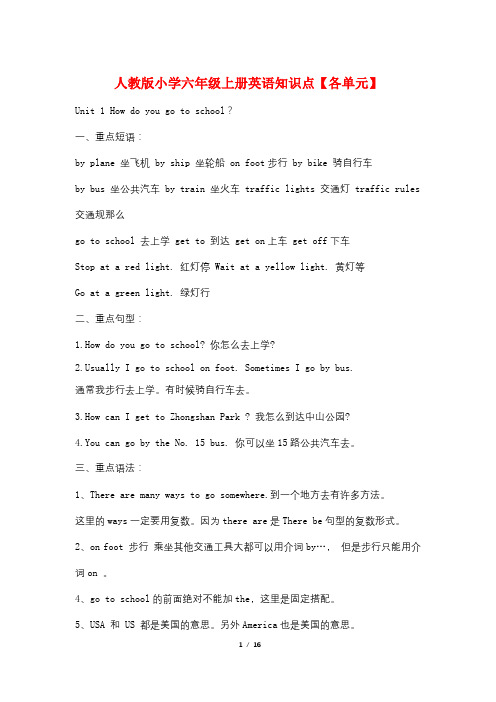
人教版小学六年级上册英语知识点【各单元】Unit 1 How do you go to school?一、重点短语:by plane 坐飞机 by ship 坐轮船 on foot步行 by bike 骑自行车by bus 坐公共汽车 by train 坐火车 traffic lights 交通灯 traffic rules 交通规那么go to school 去上学 get to 到达 get on上车 get off下车Stop at a red light. 红灯停 Wait at a yellow light. 黄灯等Go at a green light. 绿灯行二、重点句型:1.How do you go to school? 你怎么去上学?ually I go to school on foot. Sometimes I go by bus.通常我步行去上学。
有时候骑自行车去。
3.How can I get to Zhongshan Park ? 我怎么到达中山公园?4.You can go by the No. 15 bus. 你可以坐15路公共汽车去。
三、重点语法:1、There are many ways to go somewhere.到一个地方去有许多方法。
这里的ways一定要用复数。
因为there are是There be句型的复数形式。
2、on foot 步行乘坐其他交通工具大都可以用介词by…,但是步行只能用介词on 。
4、go to school的前面绝对不能加the,这里是固定搭配。
5、USA 和 US 都是美国的意思。
另外America也是美国的意思。
6、go to the park 前面一定要加the. 如果要去的地方有具体的名字,就不能再加the ,如果要去的地方没有具体名字,都要在前面加the. ( go to school 除外。
)7、How do you go to …?你怎样到达某个地方?如果要问的是第三人称单数,那么要用:How does he/she…go to …?8、反义词:get on(上车)---get off(下车) near(近的)—far(远的) fast(快的)—slow(慢的)because(因为)—why(为什么) same(相同的)—different(不同的)9、近义词:see you---goodbye sure---certainly---of course10、频度副词:always 总是,一直 usually 通常 often经常 sometimes 有时候 never 从来不针对练习I.中英互译:boat_________ taxi_______ motorbike _______ bus _______地铁轮船飞机火车附近走路骑单车上学because_______ by car _______ sometimes________ often________II.用in,on,under,by,near填空。

人教版必修一各单元知识点总结Unit One Friendship一、重点短语through 经历,经受get through 通过;完成;接通电话2. set down 记下,放下3. a series of 一系列4. on purpose 有目的的5. in order to 为了6. at dusk 傍晚,黄昏时刻7. face to face 面对面8. fall in love 爱上9. join in 参加某个活动;take part in 参加活动join 加入组织,团队,并成为其中一员10. calm down 冷静下来11. suffer from 遭受12. be/get tired of…对…感到厌倦13. be concerned about 关心14. get on/along well with 与…相处融洽15. be good at/do well in 擅长于…16. find it + adj. to do sth. 发现做某事是…17. no longer / not …any longer 不再…18. too much 太多后接不可数n.much too 太…后接adj.19. not…until 直到…才20. it’s no pleasure doing sth 做…并不开心21. make sb. sth. 使某人成为…make sb. do sth. 使某人做某事二、语法----直接引语和间接引语概念:直接引语:直接引述别人的原话;一般前后要加引号;间接引语:用自己的话转述别人的话;间接引语在多数情况下可构成宾语从句且不要加引号;例: Mr. Black said, “ I’m busy.”Mr. Black said that he was busy.变化规则一陈述句的变化规则直接引语如果是陈述句,变为间接引语时,用连词that可省略引导,从句中的人称、时态、指示代词、时间状语、地点状语都要发生相应的变化;人称的变化——人称的变化主要是要理解句子的意思例:1. He said, “I like it very much.”→ He said that he liked it very much.2. He said to me, “I’v left my book in your room.”→ He told me that he had left his book in my room.时态的变化例:“I don’t want to set down a series of facts in a diary,” said Anne.→Anne said that she didn’t want to set down a series of facts in a diary. The boy said, “I’m using a knife.”→ The boy said that he was using a knife.▲注意:如果直接引语是客观真理,变为间接引语时,时态不变,如:He said, “Light travels much faster than sound.”He said that light travels much faster than sound.指示代词、时间状语、地点状语和动词的变化二祈使句的变化规则如果直接引语是祈使句,变为间接引语时,要将祈使句的动词原形变为带to的不定式,并根据句子意思在不定式前加上tell/ask/order等动词,如果祈使句是否定句,在不定式前面还要加上not;例:The hostess said to us, “Please sit down.”→ The hostess asked us to sit down.He said, “Don’t make so much noise, boys.”→ He told the boys not to make so much noise.三疑问句的变化规则如果直接引语是疑问句,变为间接引语时要把疑问句语序变为陈述句语序,句末用句号;一般疑问句:如果直接引语是一般疑问句,变为间接引语时,谓语动词是say或said时,要改为 ask 或asked,原问句变为由if/whether 引导的宾语从句;例:“Do you think a diary can become your friend ” the writer says.→ The writer asks us if we think a diary can become our friend.2 特殊疑问句:如果间接引语是特殊疑问句,变为间接引语时,仍用原来的引导词,但疑问句要变为陈述句;例:“What do you want ” he asked me.→ He asked me what I wantedUnit two English around the world一、重点短语1. be different from 与…不同be the same as 与…一样2. one another 相互,彼此=each other3. official language 官方语言4. at the end of 在…结束时5. because of 因为后接名词或名词性短语because 因为后接句子6. native speakers 说母语的人7. be based on 根据,依据8. at present 目前;当今9. especially 特别,尤其specially 专门地10. make use of 利用…make the best of 充分利用…11. a large number of 大量的,很多作主语,谓语动词用复数the number of …的数量作主语,谓语动词用单数12. in fact = actually= as a matter of fact 事实上13. believe it or not 信不信由你14. there is no such thing as…没有这样的事…15. be expected to …被期待做某事16. play a part/role in …在…起作用17. make lists of…列清单18. included 包括前面接包括的对象Including包括后接包括的对象19. command sb. to do sth. 命令某人去做某事command + that 从句从句用should+V原20. request sb. to do sth. 要求某人做某事request + that 从句从句用should+V原二、语法----英语中的命令command语气和请求request语气命令语气:表示直接命令某人做某事,语气比较重,不怎么礼貌,一般用于上级对下级例:1. “ Look at the example”, the teacher said to us.2. Open the window请求语气:表示请求某人做某事,语气比较缓和,非常礼貌例:1. “ Would you like to see my flat ” She asked.2. Would you please open the windowUnit 3 Travel journal一、重点短语1. travel----泛指旅行journey----指长时间长距离的陆上旅行voyage----指长距离的水上旅行,也可以指乘飞机旅行trip----常指短时间短距离的旅行tour----指周游,巡回旅游,2. prefer to 更加喜欢,宁愿prefer A to B 比起B,更喜欢Aprefer doing to doing 比起做…,宁愿做…prefer to do rather than do 与其做…, 不如…3. flow through 流过,流经4. ever since 自从5. persuade sb. to do sth. 说服某人做某事6. be fond of 喜欢7. insist on doing 坚持做某事insist + that 从句用should+ V原8. care about 关心9. change one’s mind 改变想法10. altitude 高度attitude 态度,看法11. make up one’s mind to do下定决心做某事= decide to do = make a decision to do12. give in 让步,屈服give up 放弃13. be surprised to …对…感到惊奇to one’s surprise 令某人惊讶的是…14. at last = finally = in the end 最终15. stop to do 停下来去做某事stop doing 停止做某事16. as usual 像往常一样17. so…that如此…以至于…So + adj + a/an + n. + thatSuch + a/an +adj. + n. + that18. be familiar with 对…熟悉人作主语be familiar to 为…所熟悉物作主语二、语法:现在进行时表将来现在进行时表将来,表示最近按计划或安排要进行的动作,常见的现在进行时表将来的动词有:come/ go / leave/ arrive / travel / take / stay/ do等.例:1. I’m coming. 我就来2. what are you doing next Sunday 你下个星期天做什么3. I hear that you are travelling along Mekong River. 我听说你将沿湄公河旅行4. Where are you staying at night 你们晚上待在哪里/Unit four Earthquakes一、重点短语1. right away 立刻,马上= at once = in no time2. asleep 睡着的;熟睡地fall asleep 入睡sleep 睡;睡眠sleepy 犯困的3. it seems that/ as if …看来好像…;似乎4. in ruins 成为废墟5. the number of …的数量谓语动词用单数a number of 大量谓语动词用复数6. rescue workers 营救人员Come to one’s rescue 营救某人7. be trapped 被困8. how long 多长时间how often 多久,指平率how soon 还要多久用于将来时当中,用in+时间段回答9. hundreds of thousands of 成千上万的10. dig out 挖出11. shake----泛指“动摇,震动”,常指左右、上下动摇,也可以指人“震惊,颤抖”例:1. She felt the earth shaking under him.2. She was shaken with anger.quake---- 指较强烈的震动,如地震例: The building quaked on its foundationTremble---- 指人由于寒冷、恐惧、不安等引起的身体的抖动或声音的颤抖例:Suddenly I saw her lips begin to tremble and tears begin to flow down her cheeks.Shiver---- 多指寒冷引起的颤抖、哆嗦例:A sudden gust of cold wind made me shiver.12. rise rose—risen---- vi, 上升;升起, 无被动语态;give rise to 引起Raiseraised—raised---- vt, 举起;筹集;养育Arise arose—arisen----vt, 出现常指问题或现象13. injure---- 常指因意外事故造成的损伤,也可以指感情上名誉上的伤害例:He was injured in a car accident.harm---- 泛指“伤害,损害”,既可以指有生命的,也可以指无生命的例:1. He was afraid that his fury would harm the child.2. His business was harmed for some reason.hurt---- 既可以指肉体上的伤害,也可以指精神上的伤害例:1. She hurt her leg when she fell.2. He felt hurt at your word.wound---- 一般指枪伤、刀伤等在战场上受的伤例:The bullet wounded him in the arm.14. be prepared for …= make preparations for…为…做准备15. in one’s honor 向…表示敬意;为纪念Be/ feel honored to do …做…感到很荣幸16. make /give/ deliver a speech 发言opening speech 开幕词17. give/ provide shelter to …向…提供庇护所seek shelter from…躲避18. happen to + n./ pron. 遭遇,发生happen to do sth. 偶然;碰巧happen ----指偶然发生take place----指事先计划好的事情发生二、语法----定语从句概念:在复合句中,修饰名词或代词的从句叫做定语从句;成分:先行词,即被定语从句修饰的名词或代词;关系代词:that,which,who宾格为whom,所有格为whose;或者关系副词where,when,why等;关系代词或关系副词处在先行词和定语从句之间,起着连接主从句的作用;1. 关系代词that的用法关系代词that在定语从句中既能指人,也能指物;既能做主语,也能做宾语例:1A plane is a machine that can fly. 指物,作主语2The noodles that I cooked were delicious. 指物,作宾语3Who is the man that is reading a book over there 指人,作主语4The girl that we saw yesterday was Jim’s sister,指人,作宾语2. 关系代词which的用法关系代词which在定语从句中只能指物,但既可以做宾语也能作主语例:1They planted some trees which didn’t need much water. 作主语2The fish which we bought this morning were not fresh. 作宾语3. 关系代词who,whom的用法关系代词who,whom 只能指人,在定语从句中分别作主语和宾语例:1The foreigner who helped us yesterday is from USA.作主语2The person to whom you just talked to is Mr. Li. 作宾语、4. 关系代词whose在的用法关系代词whose为关系代词who的所有格形式,其先行词既可以是人也可以是物,whose和它所修饰的名词在定语从句中既可以做主语也可以做宾语;例:1This is the scientist whose name is known all over the world. 指人,作主语2 The room whose window faces south is mine. 指物,作主语3He has written a book whose name I’ve forgotten. 指物,作宾语5. 关系副词when的用法关系副词when在定语从句中作时间状语例:1I’ll never forget the time when =during which we worked on the farm.2 Do you remember the afternoon when =on which we first met three yearsago6. 关系副词where在定语从句中的用法关系副词where在定语从句中做地点状语例:1This is the place where =at/ in which we first met.2 The hotel where = in which we stayed wasn’t very clean.7. 关系副词why在定语从句中的用法关系副词why在定语从句中作原因状语例: 1. I didn’t get a pay rise, but this wasn’t the reason why= for whichI left.2. The reason why =for which he has late was that he missed the train. Unit 5 Nelson Mandela – a modern hero一、重点词汇1. selfish 自私的selfless 无私的2. devote oneself to…致力于;献身于3. fight against 对抗,反对fight for 为…而战4. principle 原则principal 校长;主要的5. offer guidance to …给…提供指导6. out of work 失业7. join 加入组织,俱乐部,成为其中一员join in 参加活动take part in 参加活动8. as + adj +as one can 尽可能…= as + adj. +as possible9. as a matter of fact 事实上=in fact10. blow up 爆炸,炸掉11. set up 建立 ; set about 着手,开始做 set about doing sth. set off 出发,动身 ; set out 开始,出发set out to do sth.12. be sentenced to 被判…13. be equal to 与…相等;胜任14. be proud of 为…感到自豪15. give out 分发 give off 散发出气味16. die for 为…而死die of 死于自身原因,如疾病die from 死于外在原因,如车祸17. realize one’s dream of …实现..的梦想18. only 位于句首时,要主谓倒装例:Only then did we decide to answer violence with violence.Only in this way, can we protect the environment better. 二.语法----定语从句详见第四单元。
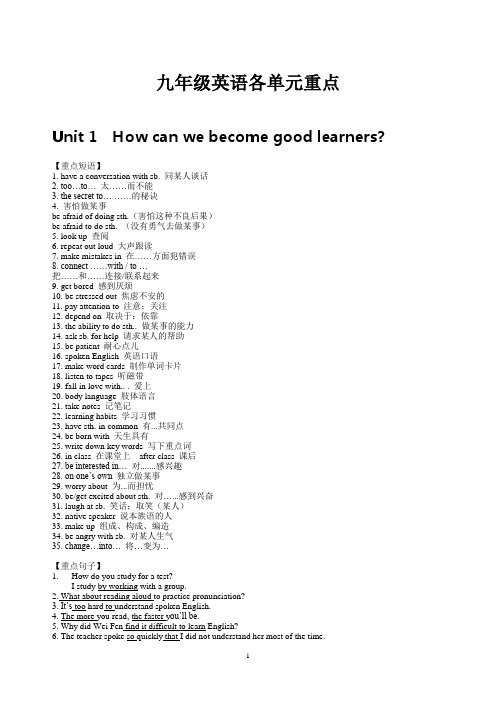
九年级英语各单元重点Unit 1 How can we become good learners? 【重点短语】1. have a conversation with sb. 同某人谈话2. too…to… 太……而不能3. the secret to… ……的秘诀4. 害怕做某事be afraid of doing sth.(害怕这种不良后果)be afraid to do sth. (没有勇气去做某事)5. look up 查阅6. repeat out loud 大声跟读7. make mistakes in 在……方面犯错误8. connect ……with / to …把……和……连接/联系起来9. get bored 感到厌烦10. be stressed out 焦虑不安的11. pay attention to 注意;关注12. depend on 取决于;依靠13. the ability to do sth.. 做某事的能力14. ask sb. for help 请求某人的帮助15. be patient 耐心点儿16. spoken English 英语口语17. make word cards 制作单词卡片18. listen to tapes 听磁带19. fall in love with.. . 爱上20. body language 肢体语言21. take notes 记笔记22. learning habits 学习习惯23. have sth. in common 有...共同点24. be born with 天生具有25. write down key words 写下重点词26. in class 在课堂上after class 课后27. be interested in… 对.......感兴趣28. on one’s own 独立做某事29. worry about 为...而担忧30. be/get excited about sth. 对…...感到兴奋31. laugh at sb. 笑话;取笑(某人)32. native speaker 说本族语的人33. make up 组成、构成、编造34. be angry with sb. 对某人生气35. change…into… 将…变为…【重点句子】1. --- How do you study for a test?--- I study by working with a group.2. What about reading aloud to practice pronunciation?3. It’s too hard to understand spoken English.4. The more you read, the faster y ou’ll be.5. Why did Wei Fen find it difficult to learn English?6. The teacher spoke so quickly that I did not understand her most of the time.7. Although I couldn’t understand everything the characters said, their body language and the expressions on their faces helped me to get the meaning.8. I could get the meaning by listening for the key words.9. I want to learn new words and more grammar so that I can have a better understanding of English movies.10. I don’t know how to increase my reading speed.11. I don’t have a partner to practice English with.12. He can’t get the pronunciation right.13. Everyone is born with the ability to learn.14. But whether or not you can do this well depends on your learning habits15. It is also easier for you to pay attention to it for a long time.16. Good learners often connect what they need to learn with something interesting.17. Even if you learn something well, you will forget it unless you use it.18. Good learners will keep practicing what they have learned, and they are not afraid of making mistakes.19. They may take notes by writing down key words or by drawing mind maps.20. Remember to take notes in class and review them on your own or with friends after class.重点句子解读:1. I study by working with a group.请仔细观察下面的例句,分析by的用法,然后补全结论部分所缺的内容。
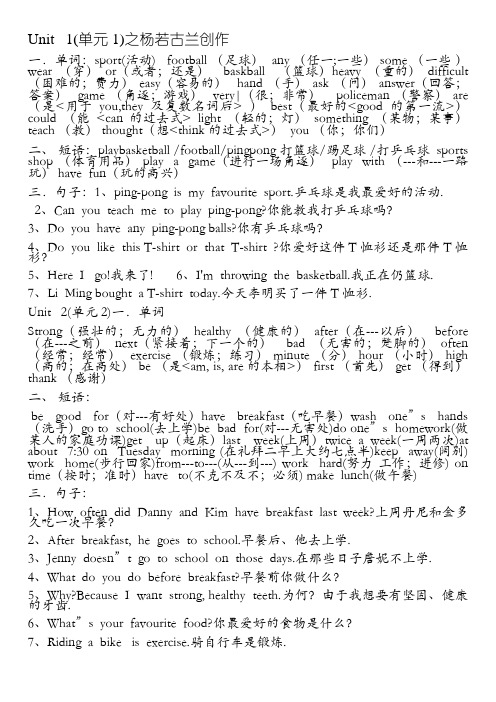
Unit 1(单元1)之杨若古兰创作一.单词:sport(活动) football (足球) any (任一;一些) some (一些)wear (穿)or(或者;还是)baskball (篮球)heavy (重的)difficult (困难的;费力) easy(容易的) hand (手) ask (问) answer(回答;答案) game (角逐;游戏) very|(很;非常)policeman (警察) are (是<用于you,they及复数名词后> )best(最好的<good的第一流>)could (能<can的过去式> light (轻的;灯)something (某物;某事)teach (教) thought(想<think的过去式>) you (你;你们)二、短语:playbasketball /football/pingpong打篮球/踢足球 /打乒乓球 sports shop (体育用品) play a game(进行一场角逐) play with (---和---一路玩) have fun(玩的高兴)三.句子:1、ping-pong is my favourite sport.乒乓球是我最爱好的活动.2、Can you teach me to play ping-pong?你能教我打乒乓球吗?3、Do you have any ping-pong balls?你有乒乓球吗?4、Do you like this T-shirt or that T-shirt ?你爱好这件T恤衫还是那件T恤衫?5、Here I go!我来了!6、I'm throwing the basketball.我正在仍篮球.7、Li Ming bought a T-shirt today.今天李明买了一件T恤衫.Unit 2(单元2)一.单词Strong(强壮的;无力的)healthy (健康的)after(在---以后)before (在---之前)next(紧接着;下一个的)bad (无害的;蹩脚的)often (经常;经常) exercise (锻炼;练习) minute (分) hour (小时) high (高的;在高处) be (是<am, is, are的本相>) first (首先) get (得到)thank (感谢)二、短语:be good for(对---有好处)have breakfast(吃早餐)wash one”s hands (洗手)go to school(去上学)be bad for(对---无害处)do one”s homework(做某人的家庭功课)get up(起床)last week(上周)twice a week(一周两次)at about 7:30 on Tuesday morning (在礼拜二早上大约七点半)keep away(阔别) work home(步行回家)from---to---(从---到---) work hard(努力工作;进修) on time(按时;准时)have to(不克不及不;必须) make lunch(做午餐)三.句子:1、How often did Danny and Kim have breakfast last week?上周丹尼和金多久吃一次早餐?2、After breakfast, he goes to school.早餐后、他去上学.3、Jenny doesn”t go to school on those days.在那些日子詹妮不上学.4、What do you do before breakfast?早餐前你做什么?5、Why?Because I want strong, healthy teeth.为何?由于我想要有坚固、健康的牙齿.6、What”s your favourite food?你最爱好的食物是什么?7、Riding a bike is exercise.骑自行车是锻炼.8、Exercise helps make your body healthy and strong.锻炼帮忙使你的身体健康和强壮.9、How many minutes does Danny exercise? 丹尼锻炼多少分钟?10、I clean my bedroom on Saturdays.我每周六打扫我的卧室.Unit 3(单元3)一.单词:fan(风扇;扇子) angry (发怒的;生气的) close (关;闭) swim (泅水<过去式 swam >) lake(湖) ship (船;舰) visit(访问;观赏) clever(聪明的)cloud (云)snowy (多雪的)Canada (加拿大)June(六月)second (第二) third (第三) wind(风)二、短语:In winter(在冬季)like to do sth(爱好做某事)look at---(看----)summer holiday(暑假)go on trips=go on a trip(去旅行)last summer(去年炎天)look up at---(向上看/抬头看---)see sb. doing sth.(看见某人正在做某事)on June25(在六月二十五号)fly home(飞回家)say hello to--(向---问好)feel happy to do sth(做某事感到高兴)in the sky(在天空)think about(思考;考虑)be afraid of---(害怕---)go skating(去滑冰)make snowmen= make a snowman(堆雪人)something different(分歧的东西)三.句子:1.What happens to trees in different seasons?树木在分歧的季节里发生了什么(变更)?2.Many trees don”t have any leaves.很多树木没有了叶子.3.We will go to the park.我们将要去公园.4.You can”t pick t he flowers in the park!你不克不及在公园里摘花!5.My family like to go on trips in the summer.我的家人爱好在炎天去旅行.6.Oh, summer`s coming, coming soon.哦,炎天要来了,很快就要来了.7.How beautiful I am!我是多么的漂亮啊!Unit 4(单元4)一.单词:find(发现;找到<过去式found>)party(晚会;聚会)tell(告诉;讲述)begin(开始)late(晚的;迟到的)early(早的;早到的)every(每个<人或物>)all (全部;所有的) cake (蛋糕) hear (听见;听到)ice cream (冰淇淋) sadly (伤心肠;哀思地) slowly(缓慢地;迟缓地)二、短语:Bus sth . for sb.=bus sb.sth.(为某人买某物)a photo of you(你的一张照片)give sth. To sb.=give sb. Sth.(把某物给某人)all of---(所有的---)talk to sb.(和某人交谈)get home(到家)get ready to do sth.= get ready for sth.(为---做好筹办)tell sb.about sth.(告诉某人有关某事)look like(看起来像)know about(晓得;了解)begin with(以---开始)at the airport(在飞机场)a little(一点儿)leave for+地点名词动身去某地;前往某地)forget to go sth.(健忘做某事)a piece of(一块/张/片---)by the river(在河边)fall into(---掉进---)三.句子:1.Here are some little flags.这儿有些小旗.2.2.What about these caps?这些帽子怎样样?3.I`ll take three T-shirts.我要买三件T恤衫.4.4.How much are the gifts?这些礼物多少钱?5. May I see them?我何以看看它们吗?6. It`s Jenny calling.我是詹妮.7. Would you come to a party for Li Ming?你情愿来介入为李明举办的聚会吗?8. Here she comes.她来了.9. It`s time for me to go.是我该走的时候了.10. Have a good trip!旅行高兴!。

Unit 1 Where did you go on vacation?一、词组、短语1、go on vacation去度假,14、feel like感觉像……/想要,2、stay at home 呆在家,15、go shopping购物,3、go to the mountains 上山/进山,16、in the past 在过去,4、go to the beach到海边去,17、walk around绕……走,5、visit museums 参观博物馆,18、too many 太多(可数名词前面),6、go to summer camp 去夏令营,19、because of 因为,7、quite a few 相当多,20、one bowl of 一碗……,8、study for为……学习,21、find out 查出来/发现,9、go out 出去,22、go on继续,10、most of the time 大部分时间/绝大多数时间,23、take photos 照相,11、taste good 尝起来味道好,24、something important重要的事情,12、have a good time玩的开心,25、up and down上上下下,13、of course当然可以,26、come up出来二、重要句子(语法):Where did you go on vacation?你到哪里去度假了?I went to New York City.我去了纽约城Did you go out with anyone? 你出去带人吗?No, No one was here. Everyone was on vacation.不,没有人在这儿大家度去度假了。
Did you buy anything special?你买了什么特别的东西吗?Yes, I bought something for my father.对,我给父亲买了一些东西。

七年级下册英语1~12单元短语句子归纳下面是七年级下册英语1~12单元的短语句子归纳:1. Unit 1:- How do you do? - 你好吗?- Nice to meet you! - 很高兴见到你!- What's your name? - 你叫什么名字?- Where are you from? - 你来自哪里?- How old are you? - 你几岁了?- I'm from China. - 我来自中国。
- My name is Tom. - 我叫汤姆。
- I'm twelve years old. - 我12岁了。
2. Unit 2:- What do you do? - 你是做什么工作的?- I'm a student. - 我是学生。
- What's your father's job? - 你爸爸是做什么工作的?- He's a doctor. - 他是个医生。
- What does your mother do? - 你妈妈是做什么的?- She's a teacher. - 她是个老师。
3. Unit 3:- What's your favorite subject? - 你最喜欢的科目是什么?- My favorite subject is English. - 我最喜欢的科目是英语。
- What do you think of math? - 你觉得数学怎么样?- I think it's difficult. - 我觉得它很难。
- How do you like music? - 你喜欢音乐吗?- I love music. - 我喜欢音乐。
4. Unit 4:- What's your hobby? - 你的爱好是什么?- My hobby is playing basketball. - 我的爱好是打篮球。
Unit 11.下国际象棋/打扑克牌2.弹吉他/拉二胡/敲鼓/拉小提琴3.打篮球/踢足球4.说英语/中文5.想要做某事6.想要成为。
7.参加艺术俱乐部8.加入一个体育俱乐部9.英语俱乐部10.游泳俱乐部11.讲故事俱乐部12.讲故事13.对某人讲。
14.和某人交谈15.校园演出16.给某人看某物(2种)17.在周末(两种)18.帮助某人做某事19.在某方面帮助某人 h20.擅长于…21.善于应付。
的/和。
相处的好22.对。
是好处/有益的23.对某人友好24.放学以后25.和某人交朋友26.学生运动中心27.需要(某人)做某事28.告诉某人某事29.告诉某人去做某事30.彼得既不会唱歌也不会跳舞。
31.他会拉小提琴吗? (并作出肯否定回答)32.她可以在我们组。
33.你能在游泳方面帮助孩子们么?34.——你们想加入什么俱乐部?——我们想加入钢琴俱乐部。
35.他也会说英语。
(两种)36.我还是不能放松。
37.你很擅长讲故事。
38.我奶奶经常在周末给我讲故事。
39.你想学中国功夫么?40.你能和你的父母相处融洽吗?41.让我看一看你的手表。
42.去看电影怎么样?43.我喜欢与老人们聊天和玩游戏。
44.那么我们需要你在运动方面帮助说英语的学生。
45.你今天有时间么?46.谢谢你帮助我。
(两种)Unit 21.一份有趣的工作2.在广播电台3.广播节目4.从夜里十二点到早上六点5.在晚上6.在一个月黑风高的晚上7.吃早餐8.吃一顿丰盛的午餐9.做运动10.做早操11.去学校12.到学校13.回家14.到家15.穿上衣服16.起床17.刷(某人的)牙18.去上班19.去学校20.上床睡觉21.从那以后22.洗淋浴23.上学/上班迟到24.该做某事的时间到了(两种)25.散步26.大量,很多27.做家庭作业28.在一点五十八分29.在上午十点十五30.在八点四十五31.在大约下午四点半32.听起来不错。
/看起来不错。
/尝起来不错。
/感觉不错。
/闻起来不错。
33.当他到家的时候,他总是先做作业。
34.为了有好的牙齿,你需要在用餐后刷牙。
35.然后他总是洗澡并吃一顿丰盛的晚餐。
36.她知道(冰淇淋)对她没有益处,但它尝起来味道好极了。
37.他要么看电视,要么玩儿电脑游戏。
38.每天要么是我、要么是我妹妹打扫房间。
39.有时放学后我打半个小时的篮球。
40.因为我没有太多的时间吃早饭,所以我通常吃得很快。
41.我有一份有趣的工作。
我很喜欢这份工作。
42.我喜欢阅读。
我喜欢读故事书。
43.我每天早上六点起床。
但是在周日早上我起床得有点晚。
44.在我们学校,8点上课。
45.良好的锻炼对我们有益。
Unit 31.到达2.多远3.骑自行车4.多长(时间)5.每天6.认为7.害怕8.像9.实现10.怎么样11.乘地铁乘公交汽车乘火车公交车程步行打的12.10513.从。
到。
14.过得愉快15.公交车站16.因为。
而感谢17.在。
和。
之间18.一个十一岁的男孩19.大约十分钟的路程20.九百本书21.成百上千的人22.到达。
23.到这儿/到那儿/到家24.害怕某人或某物25.害怕发生某事26.不敢做某事27.——你是怎么到校的?——我骑我的自行车。
28.——到学校要花多长时间?——花大约十五分钟。
29.——从你家到学校有多远?——只有两千米。
30.玛丽想知道鲍勃住在哪里。
31.对很多学生来说,到学校很简单。
32.在我家和我奶奶家之间有一条街道。
33.那里没有桥,而且水流湍急,不能划船。
因此,这些学生利用索道过河上学。
34.我爱我的老师。
对我来说他就像爸爸。
35.拥有一座桥是他们的梦想。
他们的梦想能实现吗?36.我将竭尽全力实现我的梦想。
37.我每天晚上花半小时看电视。
38.他花了大量时间做家庭作业。
39.两百个孩子种了成百上千课树。
40.去购物怎么样?41.你认为中国怎么样?42.他不敢过河。
43.我妈妈要求我立即回去,所以我不得不离开回家。
44.她和爸爸妈妈住在一个小村庄。
45.下周我们将有一个三天的假期。
Unit41.校规2.准时3.餐厅4.听音乐5.在走廊里6.在课堂上7.戴帽子8.看望朋友9.清洗餐具10.许多11.迟到12.外出娱乐13.太多14.整理床铺15.制作床16.在周末17.考虑18.制定规章制度19.过得愉快20.遵守规则21.不得不22.上课迟到23.穿校服24.练习弹吉他25.对某人要求严格26.对某事要求严格27.在上学期间的晚上28.在上学期间的白天29.帮他妈妈做早餐30.带来。
到。
31.带走。
到。
32.记得做过某事(已做)33.记得去做某事(未做)34.是某人/某物保持某种状态35.继续,重复(一直做某事)36.是某人一直做某事37.向某人学习38.学做某事39.我们必须按时来上课。
40.下次上课不要再迟到了。
41.让他们走吧。
/不要让他们走。
42.我们必须做什么?43.我们必须在图书馆里保持安静。
44.别把脏盘子留在厨房里。
45.在我能看电视之前我必须先看一本书。
但是十点前必须去睡觉。
46.请把我的手表带给我。
47.你能把这顶帽子带给你哥哥么?48.明天你能把你爸爸妈妈带到这儿么?49.教室里不要说话和喝饮料。
50.——我们每天早上一定要跑步么?——是的,必须。
51.英语课后我感到很轻松。
52.我们将有一个轻松的假期。
53.你还记得我么?54.我记得读过这本书?55.我记得我刷过盘子,但是后来我发现他们是脏的。
56.请记得明天给我打电话。
57.那个男孩一直在那跑。
58.对不起,让你久等了。
59.他经常在放学后练习说英语,因此他说英语说的很好(口语很棒)。
60.请向你的朋友学习。
61.我不得不弹钢琴。
62.家长和学校制定规则来帮助我们。
63.你桌子上的书太多了。
/不要吃太多的垃圾食物。
64.我玩游戏很开心。
65.晚饭后,我也不能放松。
66.你必须保持你的衣服干净。
67.我认为最好步行去学校。
68.还有很多事情你可以做。
69.我今天有很多事情要去做。
70.我假期有很多的作业要做。
Unit 51. 稍微;有点儿2. 想要做某事3. 对某人友好4. 一种;一类5. 不同种类的6. 各种各类的7. 在白天(强调整个期间)8. 砍倒9. 吃草/树叶10. 每天轻松20小时11. 迷路12. 在晚上;在夜里13. 其他的动物14. 安静15. 起床16. 和。
玩17. 整天18. 来自于(两种)19. 处于(极大)危险之中20. 由。
制成的(能看出来原材料)由。
制成的(看不出来原材料)在。
制造的21. 你为什么不喜欢老虎?因为他们真的很恐怖。
22. 让我们先做家庭作业吧!23. 这家书店有各种各样的书。
24. 让我们先看熊猫吧,他们是我喜爱的动物。
他们来自于中国。
为什么你喜欢他们?因为他们聪明、可爱、友好。
他们住在郑州市动物园。
25. 在动物园里有一头大象,那头大象两岁了。
我很喜欢他,因为他有点可爱。
26. 去踢足球怎么样?27. 你为什么不买一台电脑呢?28. ---你来自哪里?---我来自中国。
29. 在周末,很多人来到动物园看动物们。
这真是玩乐的好地方。
30. 因为英语很有意思,所以我很喜欢英语。
31. 他们知道回家的路。
32. 我们班有50多名学生。
33. 我们必须友好的对待老人。
34. 现在他们处于危险之中。
让我们去帮他们吧!35. 在河里游泳对我们来说是很危险的。
36. 大象是泰国的象征之一。
37. 他们也能记住有事物和水的地方。
38. 人们砍伐许多的树木,因此大象正在失去他们的家园。
39. 我们必须拯救树木,不要买象牙做的东西。
40. 我有两个兄弟。
一个是老师,另外一个是医生。
41. 男孩子们的一个来自于澳大利亚。
42. 在河里没有太多的水。
43. 我想要保持短发。
44. 他们居住在一个有很多苹果树的村庄。
45. 请告诉我如何帮助他们。
Unit 61. 看电视2. 看一场篮球赛3. 打扫房间4. 读报纸5. 用电话聊天6. 听光盘7. 用电脑8. 做汤9. 刷盘子10. 喝茶11. 外出吃饭12. 客厅13. 端午节14. 在电视上15. 通过收音机16. 稍微17. 用电脑18. 希望做某事19. 希望某人做某事20. 和。
住在一起21. 看电影22. 看一看23. 看一看空中的风筝。
24. 我看着黑板,但却什么都看不见。
25. 那听起来不错。
26. 你愿意跟我共进晚餐吗?27. 请写出以下动词的现在分词:run swim get put sit have make write live begin eatlie28. 我和父母住在郑州。
29. 朱辉向您他的家人,也希望能吃到他妈妈做的美味的粽子。
30. 这是我的一些照片。
31. 电话用语:你是谁?我是。
?请讲。
请。
接电话好吗?你是。
吗?请稍等。
32. ---你想打扫房间吗?---是的,我很乐意。
33. 这位母亲正在读故事给孩子们听。